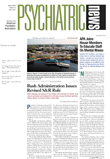In response to increased public and political scrutiny of research involving human participants, a consortium led by the Association of American Medical Colleges (AAMC) has launched a new accrediting body for programs that conduct clinical protocols with human participants.
The Association for the Accreditation of Human Research Protection Programs (AAHRPP), based in Rockville, Md., is the combined effort of the AAMC and six other organizations representing leadership from universities; medical schools; teaching hospitals; biomedical, behavioral, and social scientists; and patient and disease advocacy groups.
“This was an intense, two-and-a-half-year effort to create an entity to accredit human research,” said David Korn, M.D., senior vice president for biomedical and health research at the AAMC. The group, Korn told Psychiatric News, agreed with Greg Koski, M.D., director of the federal Office of Human Research Protections, that clinical research needed to move from an environment of compliance to one of conscience and responsibility.
“It is a duty shared by all who conduct research,” according to an AAHRPP fact sheet, “all of whom have a stake in assuring the public that such research—which holds so much promise to improve health and the quality of life—will be carried out safely.”
Recent press accounts about shutdowns of research programs around the country and alleged violations of ethics guidelines and protocols, particularly surrounding issues of informed consent, have underscored the need to ensure greater consistency of high standards for protection of human research participants. AAHRPP, founded by bioethicists, patient advocates, medical investigators, and research institutions represents the full complement of perspectives needed to encourage continued confidence on the part of the public in scientific research as a way of improving the health and quality of life of all people, said Korn.
“We, coming from an academic and research environment, know that accreditation has a powerful effect on whatever entity whose quality it is trying to maintain,” Korn told Psychiatric News. “We are used to it, we understand it, and its very theory and practice drive quality.”
The new accrediting body will be governed by a board of directors composed of individuals from the member organizations, as well as other associations concerned with research involving human participants. In addition, five representatives will be drawn from the public to represent patients and other community stakeholders.
Although the Burroughs Wellcome Fund and the Pharmaceutical Research Manufacturers’ Association have contributed financially to help establish AAHRPP, neither has a role of any kind in the governing or day-to-day running of the organization.
Accreditation will be granted to programs that have completed a rigorous self-study and peer evaluation for a set period, generally three years, after which reaccreditation will require both internal and peer review to be repeated. AAHRPP will focus not only on institutional review boards, but also on institutionwide efforts, including the role of investigators in promoting and ensuring the protection of human participants.
AAHRPP expects to begin piloting its new accreditation standards by late summer and to be fully operational by January 2002.
More information on AAHRPP is posted on the AAMC Web site at www.aamc.org/newsroom/pressrel/010523.htm. ▪
